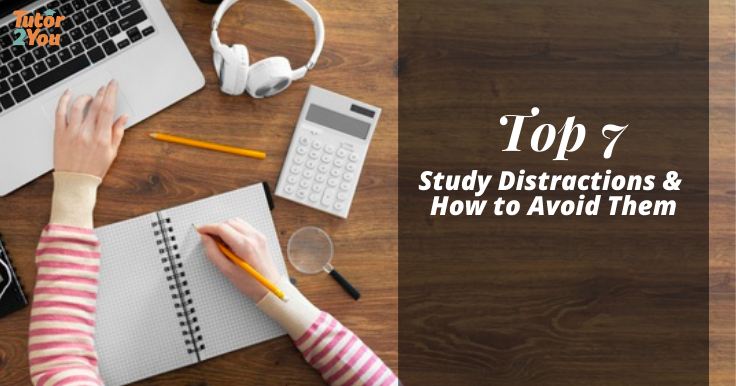
Top 7 Study Distractions and How to Avoid them
Distractions are the interference to learning. They may differ from age group to age group, but there appear to be some common denominators that distract many students.
Firstly what is a distraction? Knowing the enemy makes it easier to deal with.
A distraction is something that diverts your attention away from the desired area of focus. Once you have identified the distraction, then the solution is easier to find. In our busy world of technology there are bound to be many distractions, especially ones appealing to our senses.
Sound, sight, and taste sensory distractions are high on the list. Noises, especial popular musical ones, are distractions to young students. Looking at smartphones and TV programs rate high on the visual list. Then your taste buds are going to crave something to eat. If you are hungry – well, you are going to battle to concentrate.
What are the 7 top ranking distractions?
1. Social media rates highly on the list
Checking smartphones for messages and wanting facebook ‘likes’ every time the phone rings, to alert the owner of a message, is very distracting. These distractions include Twitter, Pinterest, and YouTube subscriptions. Short video clips may not seem significant until you are watching more than 50 of them a day.

How to deal with social media:
- Put your phone on silent or mute notifications during your study time.
- Don’t have your phone with you at this time, unless you have set it up with a timer.
- Have a little scribble notepad next to you and when a distracting thought pops into your head, write it down to deal with later. For example – call Sally for a snack date.

2. Family & Friends
Everyone wants to have a social life. The adage ‘All work and no play” is true to a certain extent. However, without strict monitoring and respect for study times, family and friends may be next on the list of seven distractions.
The trouble with family is they are always around. Friends may respect your work ethic, but they are social distractions too.
How to deal with friends and family:
- Communication is the best way to deal with family and friends.
- Explain kindly and politely that you are studying and are not able to socialise right now.
- In the case of family, try to find your own space where you are able to escape, and study in peace. If this is not possible arrange to study at school in the library or your classroom.
- Join a study group if this could help you to focus.
3. Sports and hobbies
Young people love their sports and extramural activities. These activities, with practising and matches, may be distracting. A pupil will feel torn between letting the team down and doing their own studies.

How to deal with a sports or hobbies schedule:
- Drawing up a schedule of sporting activities helps to prioritise the time allocated to the different activities.
- Many schools cancel extramural activities during a study time. Parents can guide their children to identify the most important extra activities while keeping an eye on study time.
4. Disorganisation
Being disorganised in your time management and the space you are using to study can be enormously distracting. It is frustrating when you are not able to find your books and study materials.
How to deal with disorganisation:
- Draw up a study schedule.
- Layout what and how you are going to study.
- Allocate time for study breaks.
- Check on the exam timetable and pace yourself accordingly.
5. Being hungry

Do not overlook the fact that you need to eat well to study and keep healthy. Hunger pains can distract you from the most important points and stop your memory from functioning effectively. Feeling hungry and thinking about food is a distraction.
How to deal with hunger:
- Have your regular meals and some healthy snacks available if you like snacks.
- Prepare them beforehand.
- Have food available to nourish you and not pull you away from your studies.
6. Noise

Noise can be very distracting. Some students like to study with noise around them. Music or outdoor background noises do not seem to distract them. However, some learners can not focus if there are noisy distractions.
If you find your attention is drawn away from your work when you hear noises, the chances are you are sensitive to sound, it is a distraction for you.
How to deal with noise:
- Identify the level of noise you can tolerate and deal with that accordingly. You may need complete silence and doors closed or you may be able to tolerate some background noises.
- Identify your noise levels and decide on your tolerance level.
7. Anxiety
Feelings of anxiety may be at the core of student distractions. Anxiety stresses the nervous system and affects functions like memory and learning. Children may be anxious about their test results or not understanding something well enough to write an exam in that subject. Performance anxiety or GAD, known as Generalised Anxiety Disorder, affects your routine and your memory.
How to deal with anxiety:
- A therapist may help identify the cause of the anxiety and offer some coping skills. Learning how to manage the anxiety will make a difference to your ability to memorise content for exams.
- Anxiety could be the root cause of many distractions. A student may get caught up in an anxiety distraction loop habit.
- Anxiety leads to seeking a distraction, and that leads to loss of study time, that leads to anxiety when studies are not completed. Finding the cause of the anxiety can break the loop.
Make this your mantra over distractions:
“The capacity to learn is a gift; The ability to learn is a skill; The willingness to learn is a choice.” (Brian Herbert, creator of the Dune series.)
Try to block out distractions, get to the bottom of anxiety, and choose to learn.


